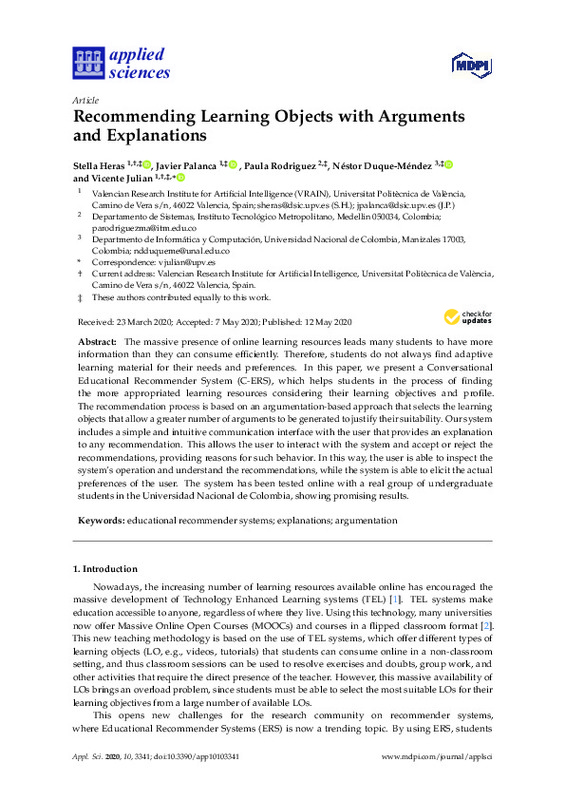Zapalska, A., & Brozik, D. (2006). Learning styles and online education. Campus-Wide Information Systems, 23(5), 325-335. doi:10.1108/10650740610714080
Rodríguez, P., Heras, S., Palanca, J., Poveda, J. M., Duque, N., & Julián, V. (2017). An educational recommender system based on argumentation theory. AI Communications, 30(1), 19-36. doi:10.3233/aic-170724
Chen, L., & Pu, P. (2011). Critiquing-based recommenders: survey and emerging trends. User Modeling and User-Adapted Interaction, 22(1-2), 125-150. doi:10.1007/s11257-011-9108-6
[+]
Zapalska, A., & Brozik, D. (2006). Learning styles and online education. Campus-Wide Information Systems, 23(5), 325-335. doi:10.1108/10650740610714080
Rodríguez, P., Heras, S., Palanca, J., Poveda, J. M., Duque, N., & Julián, V. (2017). An educational recommender system based on argumentation theory. AI Communications, 30(1), 19-36. doi:10.3233/aic-170724
Chen, L., & Pu, P. (2011). Critiquing-based recommenders: survey and emerging trends. User Modeling and User-Adapted Interaction, 22(1-2), 125-150. doi:10.1007/s11257-011-9108-6
He, C., Parra, D., & Verbert, K. (2016). Interactive recommender systems: A survey of the state of the art and future research challenges and opportunities. Expert Systems with Applications, 56, 9-27. doi:10.1016/j.eswa.2016.02.013
Vig, J., Sen, S., & Riedl, J. (2009). Tagsplanations. Proceedings of the 14th international conference on Intelligent user interfaces. doi:10.1145/1502650.1502661
Symeonidis, P., Nanopoulos, A., & Manolopoulos, Y. (2009). MoviExplain. Proceedings of the third ACM conference on Recommender systems - RecSys ’09. doi:10.1145/1639714.1639777
Fogg, B. J. (2002). Persuasive technology. Ubiquity, 2002(December), 2. doi:10.1145/764008.763957
Benbasat, I., & Wang, W. (2005). Trust In and Adoption of Online Recommendation Agents. Journal of the Association for Information Systems, 6(3), 72-101. doi:10.17705/1jais.00065
Sikka, R., Dhankhar, A., & Rana, C. (2012). A Survey Paper on E-Learning Recommender System. International Journal of Computer Applications, 47(9), 27-30. doi:10.5120/7218-0024
Salehi, M., Pourzaferani, M., & Razavi, S. A. (2013). Hybrid attribute-based recommender system for learning material using genetic algorithm and a multidimensional information model. Egyptian Informatics Journal, 14(1), 67-78. doi:10.1016/j.eij.2012.12.001
Dwivedi, P., & Bharadwaj, K. K. (2013). e-Learning recommender system for a group of learners based on the unified learner profile approach. Expert Systems, 32(2), 264-276. doi:10.1111/exsy.12061
Tarus, J. K., Niu, Z., & Mustafa, G. (2017). Knowledge-based recommendation: a review of ontology-based recommender systems for e-learning. Artificial Intelligence Review, 50(1), 21-48. doi:10.1007/s10462-017-9539-5
BRIGUEZ, C. E., CAPOBIANCO, M., & MAGUITMAN, A. G. (2013). A THEORETICAL FRAMEWORK FOR TRUST-BASED NEWS RECOMMENDER SYSTEMS AND ITS IMPLEMENTATION USING DEFEASIBLE ARGUMENTATION. International Journal on Artificial Intelligence Tools, 22(04), 1350021. doi:10.1142/s0218213013500218
Recio-García, J. A., Quijano, L., & Díaz-Agudo, B. (2013). Including social factors in an argumentative model for Group Decision Support Systems. Decision Support Systems, 56, 48-55. doi:10.1016/j.dss.2013.05.007
Briguez, C. E., Budán, M. C. D., Deagustini, C. A. D., Maguitman, A. G., Capobianco, M., & Simari, G. R. (2014). Argument-based mixed recommenders and their application to movie suggestion. Expert Systems with Applications, 41(14), 6467-6482. doi:10.1016/j.eswa.2014.03.046
Klašnja-Milićević, A., Ivanović, M., & Nanopoulos, A. (2015). Recommender systems in e-learning environments: a survey of the state-of-the-art and possible extensions. Artificial Intelligence Review, 44(4), 571-604. doi:10.1007/s10462-015-9440-z
The VARK Questionnaire-Spanish Versionhttps://vark-learn.com/wp-content/uploads/2014/08/The-VARK-Questionnaire-Spanish.pdf
GARCÍA, A. J., & SIMARI, G. R. (2004). Defeasible logic programming: an argumentative approach. Theory and Practice of Logic Programming, 4(1+2), 95-138. doi:10.1017/s1471068403001674
Gelfond, M., & Lifschitz, V. (1991). Classical negation in logic programs and disjunctive databases. New Generation Computing, 9(3-4), 365-385. doi:10.1007/bf03037169
Snow, R. E. (1991). Aptitude-treatment interaction as a framework for research on individual differences in psychotherapy. Journal of Consulting and Clinical Psychology, 59(2), 205-216. doi:10.1037/0022-006x.59.2.205
[-]









